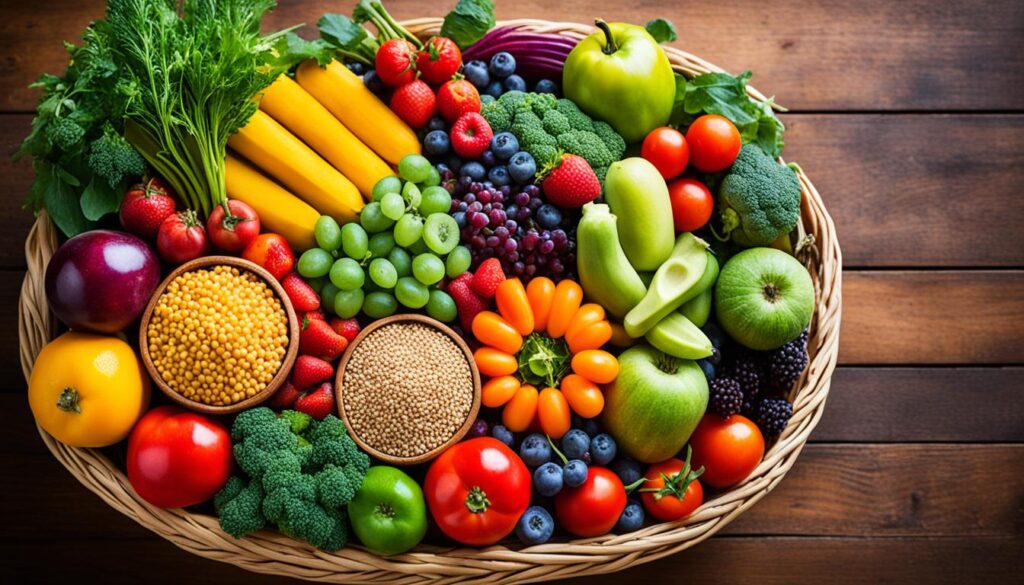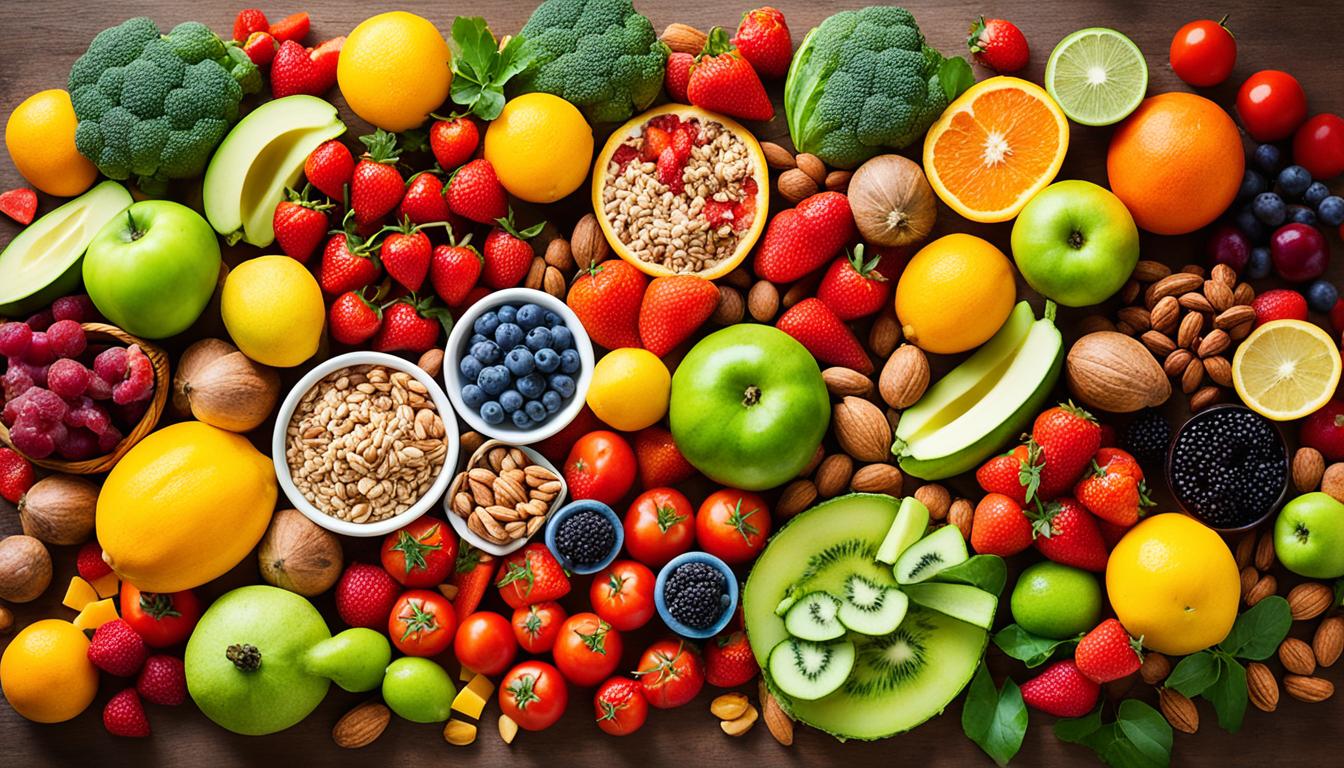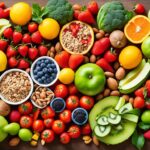What if eating simple, whole foods could make us healthier and happier? Foods that are either barely processed or not at all can change the game. They help our bodies and the planet. Eating this way can lower disease risks and lessen our impact on Earth. Let’s start a journey towards tasty, healthier living.
Key Takeaways
- Whole foods are nutrient-dense, providing essential vitamins, minerals, fiber, and healthy fats.
- A whole food diet can reduce your risk of cancer, heart disease, and type 2 diabetes.1
- Whole food production has a significantly lower environmental impact compared to typical meat and dairy diets.1
- Canada is the only country to base its dietary guidelines on impartially funded, evidence-based science.1
- Whole Foods is leading the way in reducing food waste through innovative initiatives.2
What are Whole Foods?
Whole foods are as the name says – not processed or processed very little.3 They stay close to their natural form, free from added sugars, oils, or artificial stuff.4
Defining Whole Foods
They are crucial for a healthy diet, being pure and packed with nutrients.3 Such foods are not tainted by preservatives, flavorings, or any extra elements found in processed foods. Examples include fresh fruits, veggies, brown rice, quinoa, legumes, nuts, seeds, and healthy meats.
Unprocessed and Minimally Processed
Whole foods are very natural, not needing a lot of processing.4 They don’t go through big manufacturing changes. This keeps their ingredients list simple and knowable.
Examples of Whole Foods
You can find whole foods in many places, from the produce section to the bulk bins.4 Think of leafy greens, berries, and root veggies. Add in grains, legumes, nuts, seeds, and good quality animal proteins. These offer lots of nutrients like vitamins, minerals, and fiber for our health.
The Power of a Whole Food Diet
A whole food diet is centered around plants. It means eating more vegetables, fruits, whole grains, and nuts. This diet avoids processed food with sugars, unhealthy fats, and additives.5 It focuses on eating animal products in moderation. By choosing whole foods, you get more nutrients, less inflammation, and reduce the risk of diseases.6
Plant-Based or Plant-Forward
This diet puts plants at the heart of your meals. You eat lots of fruits, veggies, and nuts. It’s full of vitamins, minerals, and fiber that are good for you.6 This way, you eat less processed and animal foods, which can be bad for your health.
Limiting Processed and Refined Foods
Foods like white bread and sugary snacks aren’t good for you. They don’t have the good stuff that whole foods do. Plus, they can have chemicals that harm your health over time.5 By cutting back on these foods, you can focus on eating foods that are better for your body and mind.
Mindful Consumption of Animal Products
This diet isn’t against eating animal foods. But it suggests being smart about how much you eat. It’s about choosing more plants than animal foods.5 Doing this gives you a diet that’s good for you and gentle on the planet.
Nutritional Benefits of Whole Foods
Whole foods are full of vitamins, minerals, and nutrients for our body. They give us vitamins like C and A, and minerals like iron and calcium. These come without the bad stuff in processed foods, like preservatives and artificial ingredients.7
Essential Vitamins and Minerals
Whole foods have lots of fiber, vitamins, minerals, and plant chemicals that are good for us.7 One cup of foods like red bell peppers, kiwi, or orange slices can give more than enough vitamin C for the day.8
Fiber for Digestive Health
Whole foods also offer plenty of fiber. Fiber is great for digestion and keeping blood sugar levels steady.7 After grains are processed, they lose some nutrients, like fiber, which is not good for health.7
Healthy Fats and Protein
Healthy fats in nuts, seeds, and avocados are also in whole foods. Plus, they have plant proteins we need.7 Using extra virgin olive oil is good for your heart because it has a healthy fat called oleic acid.8
Disease-Fighting Properties of Whole Foods
Whole foods are packed with nutrients and have special powers that fight diseases. They have antioxidants and phytonutrients. These help reduce inflammation, which is connected to many health issues.9
Eating lots of fruits, veggies, nuts, and seeds can make your heart healthier. This is crucial since heart disease kills 610,000 Americans each year.9
Boosting Immune System
Whole foods are key for a healthy immune system because they are nutrient-rich. They fight off infections and diseases.9
Flu and pneumonia are a big deal, ranking as the eighth cause of death in the US.9 Eating five to six servings of fruits and veggies daily boosts how well your body reacts to pneumonia vaccines. This is especially true for older adults.9
Cancer Prevention
Studies show that eating whole foods could lower cancer risk, especially digestive system cancers. The chemicals and antioxidants in these foods stop cancer cell growth and keep our cells healthy.10
Blueberries have cancer-fighting antioxidants that destroy harmful free radicals.10 Plus, pumpkin seeds lower the chances of getting breast and stomach cancer.10
Adding more whole foods to your meals gives you their disease-fighting benefits. This lowers inflammation, boosts immune health, and could prevent cancer. It’s a great way to lead a healthier, more energetic life.
Whole Foods and Sustainability
The whole food movement and sustainability go hand in hand. A diet based on whole foods helps the earth by using fewer resources. This is better than diets heavy in processed foods and meats.11 Farming these foods often means using less land, water, and energy.11 Also, eating local foods cuts down on the pollution from moving food long distances.
Whole Foods Market is a big supporter of being green.11 It made sure most of its trash didn’t go to landfills in 2022.11 Almost every store recycled, and many also composted.11 It also bought a lot of fair trade products to help farmers and workers.11
The company didn’t just help the planet within its stores. In 2022, it gave away 30 million meals and money to 1,000 groups.11 It also supports local farming through its loan program.11
Moreover, the Whole Planet Foundation gave over 33,000 small loans.11 And there were 57 grants to help different communities. This support happened in 39 cities in 2022.11
By backing green farming, local food, and eco steps, Whole Foods Market is a front runner. It leads the whole foods and local food movement towards a sustainable future.11,12
Incorporating Whole Foods into Your Diet

Adding more whole foods to your meals is simple. Begin by filling your kitchen with key items. These include frozen vegetables, dried legumes, and fresh produce.3
Stocking Up on Staples
It’s crucial to have a stocked pantry for easy, healthy cooking. Include whole grains, beans, nuts, and lots of fruits and veggies. This foundation is perfect for a plant-based diet.
Meal Planning and Preparation
Planning your meals ahead can transform your diet. Map out what you’ll eat each week and buy the needed whole foods. This way, you’ll avoid reaching for unhealthy, processed options.
Crowding Out Animal Products
Choosing more whole foods naturally reduces your animal product intake. Plant proteins like tofu and legumes become meal stars. This move can lower your risk of heart disease and other health problems.3
Embracing Herbs and Spices
Don’t forget about herbs and spices. They make your dishes taste better without the unhealthy add-ons. Plus, they’re packed with health benefits.
Cooking with Whole Foods
Using whole foods in your cooking means making meals that are good for you.13 You’ll find guides on what’s in season, like asparagus and berries. This shows a love for fresh, seasonal foods.13 There are also tips and recipes for grilling, pointing to choices that are good for your health.
Nutrient-Rich Ingredients
It’s all about picking the best foods, such as leafy greens, berries, nuts, and seeds. They’re full of vitamins, minerals, and antioxidants.13 You’ll see a push for eco-friendly seafood, like wild-caught halibut.13 Various food cultures are brought in, such as Greek and Spanish dishes. This adds a lot of flavor to your cooking.
Healthy Cooking Techniques
There’s a focus on cooking in a way that keeps the most nutrients. Methods like steaming, roasting, and sautéing are key.13 You’ll get detailed info on using beans and apples well, plus how to handle a knife. This is all about learning more to cook better.
Delicious Whole Food Recipes
Try out different recipes with whole foods, like grain bowls and veggie dishes.13 There are plans that highlight grains and beans, which is great for your health and budget.13 You can find recipes for everyone, such as gluten-free and vegan options. This makes sure there’s something for every diet.13 For families, there are recipes designed to please both kids and adults.13 You’ll also get drink recipes, including non-alcoholic mocktails and wine tips from a Master Sommelier. This makes sure your drinks pair well with your meals.
Mindful Eating and Whole Foods

Adding whole foods to your meals helps build a mindful eating style.14 A study by The Harris Poll for Whole Foods Market showed 79% want to eat mindfully.14 Being mindful lets you enjoy your food more, be happier with what you eat, and have better digestion.
Cultivating Mindfulness
Take a moment to enjoy the taste, feel, and smell of your food.15 It can take up to 20 minutes for your brain to realize you’re full. Being aware of your food helps you control how much you eat and not overdo it.
Enhancing Satisfaction
Focus on eating whole, rich foods to feel more satisfied and fulfilled.14 85% of people in the poll want to feel better after the pandemic. Mindful eating helps you feel good about the food you eat.
Promoting Healthy Digestion
Whole foods, filled with fiber and nutrients, keep your gut health in check.15 The Healthy Eating Plate says to fill your plate with veggies, some protein, and grains or fruit. This helps keep your digestion in top shape.
Being mindful about whole foods not only nourishes your body but also your mind.14 Headspace, known for guiding millions in meditation, supports a mindful food journey. Whole Foods Market, with over 500 stores in the U.S., Canada, and the UK, offers many choices for a healthy and mindful life.14
Whole Foods on a Budget
Eating healthy whole foods doesn’t have to be expensive. You can save money while still eating well. Mixing affordable whole foods into your meals is easy.
Budget-Friendly Strategies
First, buy affordable basics like frozen veggies and canned goods in bulk. This saves money. Visit local markets and community grocery stores for good deals.16 Meal planning and cooking in batches also stretch your dollar.16
Affordable Whole Food Options
For low-budget shopping, get items such as frozen fruit and quinoa.16 Also, search for sales on items like cheese, meat, and salads. Be aware of any item limits or exclusions.16
Using smart shopping tips, anyone can eat well without spending too much.16
Conclusion
Adding whole foods as your diet’s base can change your life for the better. This choice affects your health, well-being, and the environment. It focuses on foods that are minimally processed and full of nutrients. This way, you give your body important vitamins, minerals, fiber, and antioxidants. You also lower the chance of getting sick and feel more lively every day.17 This kind of eating matches well with sustainable agriculture practices and the local food movement. So, it’s a win-win for staying healthy and taking care of the planet.18
Want to eat better, boost your health, or help the planet? Choosing more whole foods is a smart choice.1718 It starts you on a path to a healthier and earth-friendly life. This journey is good for you and the world around you.
FAQ
What are whole foods?
Whole foods are either unprocessed or minimally processed. This includes things like whole grains and fresh fruits. They’re as natural as can be, with no added sugars or artificial ingredients.
What are the benefits of a whole food diet?
A whole food diet is centered on plants and is very nutritious. It gives you important vitamins, minerals, and fiber. This kind of diet helps fight diseases and is friendly to our planet.
What are some examples of whole foods?
Think of fresh fruits, whole grains, and veggies. Also, foods with nuts, seeds, and lean proteins. These items are packed with nutrients, fitting a whole food diet perfectly.
How can I incorporate more whole foods into my diet?
Start by keeping your kitchen stocked with whole food basics. These include fresh produce and whole grains. Try planning your meals to eat more plant-based foods. Using herbs and spices can make these dishes tasty.
How can cooking with whole foods benefit me?
Cooking with whole foods lets you make meals that are good for you. Use ingredients like greens, berries, nuts, and seeds. Try cooking methods that keep the food’s nutritional value high.
How can I eat whole foods on a budget?
Eating whole foods without breaking the bank is doable. Buy lots of frozen veggies and canned goods. Check out local markets and discount stores. Planning meals ahead and cooking in batches can also help.
Source Links
- https://allplants.com/blog/lifestyle/why-choose-whole-foods
- https://www.wholefoodsmarket.com/mission-in-action/environmental-stewardship/food-waste
- https://www.everydayhealth.com/diet-nutrition/whole-foods-diet/
- https://www.nyc.gov/site/doh/health/health-topics/whole-foods.page
- https://www.betheshyft.com/healthwatch/nutrition/the-power-of-whole-foods-why-you-should-incorporate-them-into-your-diet/
- https://wellvine.com/blogs/articles/understanding-the-hidden-powers-of-a-whole-food-diet
- https://www.webmd.com/diet/features/the-benefits-of-healthy-whole-foods
- https://www.healthline.com/nutrition/21-reasons-to-eat-real-food
- https://healthbeat.corewellhealth.org/disease-fighting-diet/
- https://www.uhone.com/health-and-wellness/healthy-living/9-delicious-disease-fighting-foods-you-should-eat-every-week
- https://media.wholefoodsmarket.com/whole-foods-market-unveils-latest-impact-report-on-nourishing-a-more-sustainable-global-food-system/
- https://www.investopedia.com/articles/company-insights/092816/how-sustainable-whole-foods-competitive-advantage-wfm.asp
- https://www.wholefoodsmarket.com/tips-and-ideas
- https://media.wholefoodsmarket.com/whole-foods-market-and-headspace-team-up/
- https://lisaschmidtcounseling.com/zzz-pages-archive/mindful-eating-2/
- https://www.wholefoodsmarket.com/ways-to-save
- https://www.linkedin.com/pulse/decline-whole-foods-critical-analysis-its-value-lack-yakhin-mba–j0fac
- https://harbert.auburn.edu/binaries/documents/center-for-ethical-organizational-cultures/cases/whole-foods.pdf

